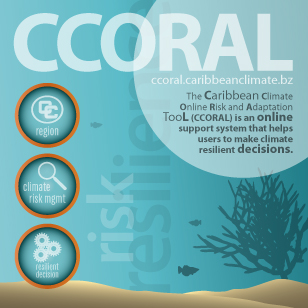Caribbean community launches ground-breaking tool for climate risk assessment
Caribbean community launches ground-breaking tool for climate risk assessment
By Tyrone Hall, Caribbean Community Climate Change Centre
The Caribbean Community Climate Change Centre (5Cs) launches a ground-breaking tool for climate risk assessment in decision-making, at an event in Saint Lucia today. The event, which will be attended by Saint Lucia Prime Minister Dr. Kenny Anthony, together with permanent secretaries from ministries of finance and planning, development partners and media from across the region, will officially introduce the Caribbean Climate Online Risk and Adaptation TooL (CCORAL).
The tool has been endorsed by Chairman of the Intergovernmental Panel on Climate Change (IPCC) Dr. Rajendra Kumar Pachauri. It will promote climate-smart development by helping to embed a risk management ethic in decision-making processes across government, the private sector and civil society.
“The development of the risk assessment tool [is] an extremely important asset in assessing the risk from the impacts of climate change in the Caribbean region,” said Dr. Pachauri. The two dozen island nations of the Caribbean, and their 40 million residents face heightened vulnerability to climate change. Rising temperatures and sea levels, on top of powerful hurricanes, threaten lives, property and livelihoods.
Against this background, CCORAL will help to boost the capacity of these countries to assess the various climate-related risks facing their future investments – and will help decision-makers to identify adaptation and mitigation options.
“CCORAL is a practical approach to cost-effective climate-resilient investment projects,” says Dr. Kenrick Leslie, Executive Director of the Caribbean Community Climate Change Centre. “CCORAL will aid the region in defining approaches and solutions that will provide benefits now and in the future by adopting ‘no-regret’ actions and flexible measures.”
 CCORAL is intended to be used primarily by agencies at the regional and national level with responsibility for development, planning and finance, the private sector and non-governmental organisations. Ministries of Finance and/or Planning are central to the initial efforts to anchor this tool in climate resilience-building decisions. Civil society organisations, universities, financial services and development partners and local communities can also use CCORAL to inform actions that must embed climate considerations. The tool is available to all member countries through an open source online platform: ccoral.caribbeanclimate.bz
CCORAL is intended to be used primarily by agencies at the regional and national level with responsibility for development, planning and finance, the private sector and non-governmental organisations. Ministries of Finance and/or Planning are central to the initial efforts to anchor this tool in climate resilience-building decisions. Civil society organisations, universities, financial services and development partners and local communities can also use CCORAL to inform actions that must embed climate considerations. The tool is available to all member countries through an open source online platform: ccoral.caribbeanclimate.bz
According to Keith Nichols, Programme Development Specialist at the Caribbean Community Climate Change Centre, “the development of the risk assessment tool emerged after an extensive consultation process with regional stakeholders to ensure authenticity, relevance and ownership”.
It is a direct response to the requirements of the Regional Framework for Achieving Development Resilient to Climate Change and the landmark Implementation Plan, which were endorsed by CARICOM Heads of Government in 2009 and 2012, respectively. The Implementation Plan acknowledges that a transformational change in mindsets, institutional arrangements, operating systems, collaborative approaches and integrated planning mechanisms are essential to deliver the strategic elements and goals of the Regional Framework.
CCORAL has been developed by the Caribbean Community Climate Change Centre with funding from the United Kingdom Department for International Development (DFID) and CDKN.
Please read the CCORAL fact sheet for more information about the tool and see this infographic.
Contact: Tyrone Hall, Communications Specialist, Caribbean Community Climate Change Centre. Email: thall@caribbeanclimate.bz; phone: (501) 630-8615
________________________________________________________________________
The Caribbean Community Climate Change Centre coordinates the region’s response to climate change. Officially opened in August 2005, the Centre is the key node for information on climate change issues and the region’s response to managing and adapting to climate change. It maintains the Caribbean’s most extensive repository of information and data on climate change specific to the region, which in part enables it to provide climate change-related policy advice and guidelines to CARICOM member states through the CARICOM Secretariat. In this role, the Centre is recognized by the United Nations Framework Convention on Climate Change, the United Nations Environment Programme, and other international agencies as the focal point for climate change issues in the Caribbean.
Image courtesy Panos.
